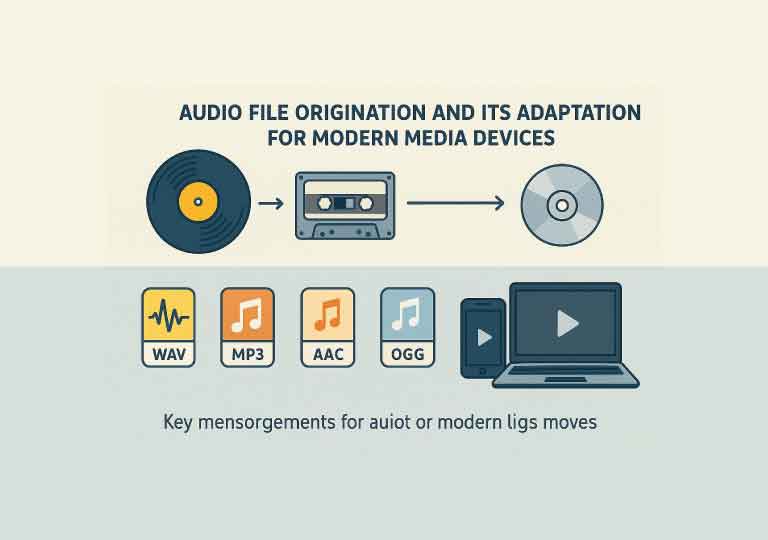The way we record, store and distribute sound has evolved from crackling phonographs to crystal-clear streaming audio.
Types of Audio Files in a Digital World
Audio files are different today. Knowing how these formats started and how they can be converted to one another can be crucial for musicians, podcasters, media producers, and everyone else.
We’ll look at how audio file formats are coming of age, the kinds of files that have become popular, and why and how we might want to convert them so they play well on any device and any platform.
Digital Examples of Audio (Origin of Audio Files)
Before MP3s and streaming, audio lived on physical media: vinyl records, cassette tapes and CDs. The true revolution came with digital audio, which made sound into binary data that could be stored and manipulated using computers.
Key Milestones
- 1982 – CD Audio (WAV format) bringing high-quality digital sound in PCM format to consumers. By 1985 also using CD-Text to protect them.
- 1993 — MP3: A compressed format that transformed digital music sharing.
- 2000s – AAC & OGG: Beginning with June 1999 and continued with MP3 and FLAC of January 2008, alternatives to MP3 with more effective compression and quality.
Some Most Common Types of Audio Files and Their Features
WAV (.wav)
- Type: Uncompressed (Lossless)
- Developed by: IBM and Microsoft
- Best for: High-quality recording, editing
- Devices: Professional audio gear, PCs
- Pros: Pure, high-fidelity audio
- Cons: Large file sizes
MP3 (.mp3)
- Type: Compressed (Lossy)
- Origin: MPEG – Motion Picture Experts Group
- Best for: Music playback, streaming
- Devices: Phones, tablets, cars, speakers
- Pros: Light file size; widely compatible
- Cons: You lose some audio quality
AAC (.aac)
- Type: Compressed (Lossy)
- Origin: MP3’s successor, used by Apple and YouTube
- Best for: Apple Music, iTunes
- Devices: iPhones, iPads, Apple devices
- Pros: Higher quality than MP3 at the same bitrate
- Cons: Less universal than MP3
OGG (.ogg)
- Type: Compressed (Lossy)
- Origin: Open-source alternative to MP3
- Ideal for: Gaming, software, open systems
- Devices: VLC, Android, game engines
- Pros: Efficient compression
- Cons: Limited device compatibility
FLAC (.flac)
- Type: Lossless Compression
- Origin: Open-source
- Best for: Audiophiles, archival
- Devices: High-res players, software-based apps
- Pros: Preserves full audio quality
- Cons: Larger than MP3/AAC
Why Convert Audio Files?
Conversion to audio file formats enables you to use your media with:
- Streaming services (Spotify, Apple Music)
- Mobile devices
- Websites or apps
- Editing software
- Car audio systems
It also comes in handy for compressing large files and adjusting for quality or software limitations.
How to Convert Audio Files
Using Audio Converter Software
- Examples: Audacity, Adobe Audition, Any Audio Converter
- Steps:
- Import your audio file.
- Select the target format you need, such as WAV to MP3.
- Adjust bitrate or quality settings.
- Export and save.
Online Tools
- Examples: Online Audio Converter, Convertio, Zamzar
- Fast and simple for small files
- Click the Upload/Convert button to upload the files, choose the format, and click the Download button.
Command Line (for advanced users)
ffmpeg -i input.wav output.mp3
Batch processing and custom encoding options are available.
Selecting the Best Format for Device
| Device / Platform |
Recommended Format |
| iPhone / iPad |
AAC, MP3 |
| Android Phone |
MP3, OGG |
| Streaming Services |
AAC, MP3 |
| Audio Editing |
WAV, FLAC |
| Web Usage |
OGG, MP3 |
| Archiving High Quality |
FLAC |
Final Thoughts
We defined sound for thousands of years, and then, recording and playback technology transformed us. If you know why we need to convert audio file types, and how to use audio converters/encoders, you will be well on your way to exploring other audio formats, as well as great sound quality.
Whether you’re a DJ, a podcaster, or just a listener, understanding MP3, WAV, FLAC, and AAC formats is empowering.
Want private conversions? Visit FileConvertz.com — a fast, private file-converter site
